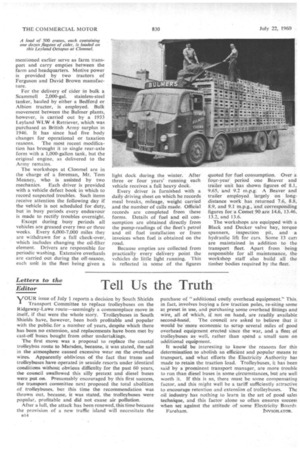Tell Us the Truth
Page 48

If you've noticed an error in this article please click here to report it so we can fix it.
yOUR issue of July 1 reports a decision by South Shields Transport Committee to replace trolleybuses on the Ridgeway-Lawe route—seemingly a commonplace move in itself, if that were the whole story. Trolleybuses in South Shields have, however, been both profitable and popular with the public for a number of years, despite which there has been no extension, and replacements have been met by cast-off buses bought from other undertakings. The first move was a proposal to replace the coastal trolleybus route to Marsden, because, it was stated, the salt in the atmosphere caused excessive wear on the overhead wires, Apparently oblivious of the fact that trams and trolleybuses have operated in seaside resorts under identical conditions without obvious difficulty for the past 60 years, the council swallowed this silly pretext and diesel buses were plat 041. Presumably encouraged by this first success, the transport committee next proposed the total abolition of trolleybuses, but this time the recommendation was thrown out, because, it was stated, the trolleybuses were popular, profitable and did not cause air polfntiott.
After a lull, the attack has been renewed, this time because the provision of a new traffic island will necessitate the
purchase of " additional costly overhead equipment." This, in fact, involves buying a few traction poles, re-siting some at preset in use, and purchasing some overhead fittings and all of which, if not on hand, are readily available second-band. The council are asked to believe that it would be more economic to scrap several miles of good overhead equipment erected since the war, and a fleet of trolleybuses as well, rather than spend a small sum on additional equipment. it would be interesting to know the reasons for this determination to abolish an efficient and popular means to transport, and what efforts the Electricity Authority has made to retain the traction load. Tmlleybuses, it has been said by a prominent transport manager, are more trouble to run than diesel buses in some circumstances, but are well worth it. If this is so, there must be some compensating factor, and this might well he a tariff sufficiently attractive to encottraee retention and extension of trolleybuses. The oil industry has nothing to learn in the art of good sales technique, and this factor alone so often ensures success when set against the attitude of some Electricity Boards Fareham. INVIGILATOR.




































































































